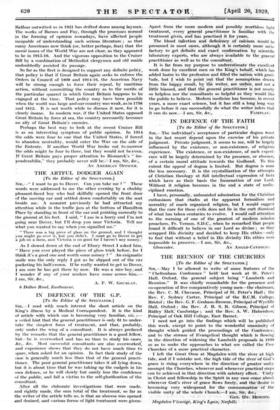IN DEFENCE OF THE G.P. [To the Editor of the
SPECTATOR.] -
Snr,—I read with much interest the short article on the King's illness by a Medical Correspondent. It is the kind of article with which one is becoming very familiar, viz. :— a veiled hint that the general practitioner is only fit to under- take the simplest form of treatment, and that; probably, only under the wing of a consultant. It is always prefaced by the remarks that the general practitioner is a good fellow, but—he is overworked and has no time to study his cases &c., &c. Most successful consultants are also overworked; and experience shows that they do not have much time to spare, when asked for an opinion. In fact their study of the case is generally much less than that of the general practi- tioner. The poor general practitioner takes it all lying down, but it is about time that he was taking up the cudgels in his own defence, or he will slowly but surely lose the confidence of the public, and fall a victim to the self-glorification of the consultant.
After all the elaborate investigations that were made, and rightly made, the sum total of the treatment, so far as the writer of the article tells us, is that an abscess was opened
and drained, and various forms of light treatment were given-
Apart from the more modern and possibly worthless light treatment, every general practitioner is familiar with the treatment given, and has practised it for years.
The - blood infection and deficiency of cakium would be presumed in most cases, although it is certainly more satis- factori.to get definite and exact confirmation by scientific laboratory experts, who are always available to the general practitioner as well as to the consultant.
It is far from my purpose to underestimate the excellent work done by excellent men on the King's behalf, which has added lustre to the profession and filled the nation with grafi- tuck, but I wish to point out that the assumptions drawn from the hippy result, by the. writer, are ,rurfair, and not'a little biassed, and that the general practitioner is not nearly so helpless nor the consultants so helpful as they would like the public to believe. Modern medicine has become, in recent years, a more exact science, but it has still a long long way to go before it can successfully do what the writer infers that it can do now.—I am, Sir, &c., .
























































 Previous page
Previous page